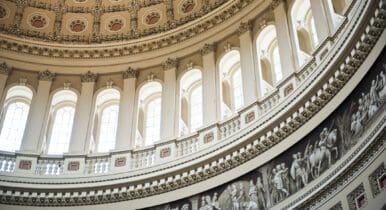How AI Could Reshape Down-Ballot Campaigns
Political consultants are increasingly eyeing artificial intelligence as a tool to reshape the fundamentals of down-ballot campaigns.
New automations and efficiencies made possible by AI, they say, can help professionalize and democratize state and local campaigns that often lack the budgets to hire the professional staffers and consultants that state-wide and national candidates have long relied on.
“One thing we can expect is that AI is going to make political consulting and services more accessible to down ballot campaigns, and so I think we’ll probably see a professionalization of down ballot campaign culture thanks to technology,” said Eric Wilson, the executive director of the Republican-aligned Center for Campaign Innovation, told C&E.
The basic idea, according to Wilson and others, is that by automating campaign tasks, like voter targeting, modeling and analysis, consultants can put their services within the financial reach of candidates running for anything from state legislative seats to school boards.
Filling a Void in the Campaign Industry
State and local races, with some exceptions, tend to be lower-budget affairs focused more around grassroots organizing and name recognition. Still, many local candidates are eager for professional help in running their campaigns.
A recent survey of nearly 1,000 local Democratic hopefuls conducted by the Pipeline Fund, a group that provides funding and support to progressive candidates, found that nearly half of respondents – 49 percent – said they received only some, very little or none of the help that they needed for their campaigns last year.
Many of those candidates said that they want access to experienced staff and campaign managers to help them navigate their races, according to the Pipeline Fund.
Local and state races are already emerging as proving grounds for AI’s use in campaigns. A report released last year by the University of Texas at Austin’s Center for Media Engagement asserted that “local campaigns are currently more likely than national campaigns to use” generative AI, in no small part because larger federal and statewide campaigns tend to be more risk-averse.
In other words, candidates running for governor’s mansions or House and Senate seats are less likely to experiment with AI technology on the campaign trail, because they see the possibility of failure as too big a risk.
Still, the report warned that the proliferation of AI in state and local campaigns comes with significant risks. AI-generated misinformation and so-called deepfakes are more likely to go unnoticed in down-ballot races than they are in contests featuring prominent national figures. What’s more, many smaller campaigns lack the money and know-how to take full advantage of AI tech, according to the report.
Putting AI to Use
Those concerns haven’t stopped some consultants from trying to deploy the technology. One Democratic consultant, who spoke on the condition of anonymity, said that they’re exploring ways to test AI on down-ballot contests before pitching the idea to federal clients.
“If we can use it to automate some of these tasks at the local level, then it becomes a case study for how we can use it when we’re working on something like a Senate race or even a presidential,” the consultant said. “It kind of helps us feel out what we should and shouldn’t do, because we’re all still learning how this all actually works.”
Phil Vangelakos, the managing partner at the Republican firm Push Digital Group, told C&E last month that his company has begun taking on clients that it would have previously turned down, because AI technology has allowed the firm to “do things quicker and at cost.”
“A traditional TV guy would charge $20,000 or $30,000 for a production. When that production can be done by AI over the course of a few hours by a single employee, it puts those billable hours in the range of a state house race,” Vangelakos said. “It would be foolish not to take that work.”
“We get to do more,” he added. “It’s actually really great for clients because it’s democratizing who gets to use a professional political firm.”

